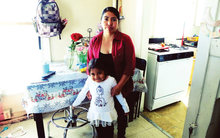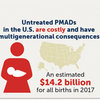0
Report
Community:
Recent research has begun to focus on the impact of housing instability, in its many forms, on child health and development. It is hypothesized that young children are at greater risk of adverse effects of living environments, as this time period serves as a critical window for establishing socialization and learning habits. Additionally, the effects of housing instability may be compounded when combined with other challenges faced by low-income families, such as lack of resources. Previous studies have found that housing instability is associated with deficits in overall academic achievement, emotional regulation, and verbal abilities.
Authored by: International Public Health Journal
Topics: Child welfare, Education, Health, Homelessness, Housing, Research
 Shared by Housing Is
Shared by Housing Is
Housing Is posted a
on May 9, 2019
International Public Health Journal
Recent research has begun to focus on the impact of housing instability, in its many forms, on child health and development.
0
News Article
Community:
May 6, 2019
A new study shows that Miami’s affordable housing crisis is so dire, the city needs at least 50,000 units just to meet the existing need. But the Connect Capital Miami Report, which was released Monday, also reveals a combination of tools and resources that could help alleviate the dearth of housing for cost-burdened residents.
Authored by: Rene Rodriguez for the Miami Herald
Topics: Funding, Housing, Legislation & Policy, Low-income, Research
 Shared by Housing Is
Shared by Housing Is
Housing Is posted a
on May 7, 2019
Rene Rodriguez for the Miami Herald
A new study shows that Miami’s affordable housing crisis is so dire, the city needs at least 50,000 units just to meet the existing need.
0
Policy Brief
Community:
May 2, 2019
Spring is in full bloom in Washington, D.C., and so are key pieces of legislation that FRAC is monitoring and weighing in on. Below is an overview of legislative proposals in the 116th Congress to look out for that would impact critical anti-hunger and anti-poverty programs.
Authored by: Lauren Badger for Food Research & Action Center
Topics: Asset building, Food insecurity, Legislation & Policy, Nutrition, Seniors
 Shared by Housing Is
Shared by Housing Is
Housing Is posted a
on May 6, 2019
Lauren Badger for Food Research & Action Center
Spring is in full bloom in Washington, D.C., and so are key pieces of legislation that FRAC is monitoring and weighing in on. Below is an overview of legislative proposals in the 116th Congress to look out for that would impact critical anti-hunger and anti-poverty programs.
0
News Article
Community:
May 1, 2019
The U.S. economy is enjoying nearly a decade of expansion since the Great Recession. Yet food insecurity -- a lack of money or resources to secure enough to eat -- still grips almost one in eight Americans. That's roughly 40 million people. While slowly improving, that figure remains stubbornly higher than before the recession, when more than one in 10 U.S. residents had difficulty knowing when and how they might eat next, according to data from the U.S. Department of Agriculture.
Authored by: Rachel Layne for CBS News
Topics: Food insecurity, Health, Low-income, Nutrition
 Shared by Housing Is
Shared by Housing Is
Housing Is posted a
on May 6, 2019
Rachel Layne for CBS News
The U.S. economy is enjoying nearly a decade of expansion since the Great Recession. Yet food insecurity -- a lack of money or resources to secure enough to eat -- still grips almost one in eight Americans. That's roughly 40 million people.
0
News Article
Community:
Apr 26, 2019
Raising the minimum wage helps low-paid workers without damaging the broader economy, the authors of two new research papers find.
Authored by: Richard Florida for City Lab
Topics: Asset building, Legislation & Policy, Low-income, Research
 Shared by Housing Is
Shared by Housing Is
Housing Is posted a
on May 6, 2019
Richard Florida for City Lab
Raising the minimum wage helps low-paid workers without damaging the broader economy, the authors of two new research papers find.
0
News Article
Community:
May 3, 2019
That’s according to the fourth and largest survey of college students’ ability to afford food and housing
Authored by: Jillian Berman for Market Watch
Topics: Food insecurity, Low-income, Nutrition, Post-secondary, Research, Youth
 Shared by Housing Is
Shared by Housing Is
Housing Is posted a
on May 6, 2019
Jillian Berman for Market Watch
That’s according to the fourth and largest survey of college students’ ability to afford food and housing
0
News Article
Community:
May 24, 2018
Nearly half of all renters can’t afford rent, and over half a million Americans are homeless on any given night. How did we get here?
Authored by: Bryce Covert for The Nation
Topics: Housing, Legislation & Policy, Low-income, West Coast
 Shared by Housing Is
Shared by Housing Is
Housing Is posted a
on May 3, 2019
Bryce Covert for The Nation
Nearly half of all renters can’t afford rent, and over half a million Americans are homeless on any given night. How did we get here?
0
Policy Brief
Community:
May 1, 2019
Stable housing plays a vital role in people’s recovery from substance use disorders (SUDs). An inability to pay rent and the threat of losing housing can lead to stress that triggers substance misuse and relapse. People experiencing homelessness who also have SUDs typically find it difficult to address their substance use without a safe place to live, because they often use alcohol or drugs to cope with the dangers of life on the streets. In 2018, Congress passed the SUPPORT for Patients and Communities Act (known as the SUPPORT Act), which provided a variety of new programs and funding opportunities to help states and localities address the opioid epidemic and broadly help people with substance use disorders.
Authored by: Center on Budget and Policy Priorities
Topics: Homelessness, Housing, Legislation & Policy, Low-income, Mental health, Research, Substance abuse
 Shared by Housing Is
Shared by Housing Is
Housing Is posted a
on May 2, 2019
Center on Budget and Policy Priorities
Stable housing plays a vital role in people’s recovery from substance use disorders (SUDs). An inability to pay rent and the threat of losing housing can lead to stress that triggers substance misuse and relapse.
0
Publication
Community:
Apr 4, 2019
Decades of policy choices and insufficient public and private investment have made the infrastructure needs of these communities acute, especially in many communities of color where past policy choices affected by racism, combined with continuing racial bias and discrimination, have resulted in a lack of needed economic resources.
Authored by: Chye-Ching Huang for The Center on Budget and Policy Priorities
Topics: Community development, Education, Housing, Legislation & Policy, Low-income
 Shared by Housing Is
Shared by Housing Is
Housing Is posted a
on May 2, 2019
Chye-Ching Huang for The Center on Budget and Policy Priorities
Decades of policy choices and insufficient public and private investment have made the infrastructure needs of these communities acute, especially in many communities of color where past policy choices affected by racism, combined with continuing racial bias and discrimination, have resulted in a la
0
News Article
Community:
Apr 18, 2019
Local health care providers say they often struggle to address an individual’s needs outside the clinic, such as access to housing and transportation. In an effort to address the whole person, a new partnership among county officials, health care providers and not-for-profit service agencies was formed to better streamline patient access to services.
Authored by: Michaela Ramm for The Gazette
Topics: Health, Partnerships
 Shared by Housing Is
Shared by Housing Is
Housing Is posted a
on May 2, 2019
Michaela Ramm for The Gazette
Local health care providers say they often struggle to address an individual’s needs outside the clinic, such as access to housing and transportation.
0
Publication
Community:
Apr 25, 2019
Research shows that clinical care is only one factor that impacts population health and that a collection of other factors – including the natural and built environment where people live, education economic stability, food, and community and social context – grouped under the term social determinants of health (SDOH), have significantly more influence on care utilization, outcomes, and population health. Together, these factors account for 60% of preventable mortality.
Authored by: Daniel Young for The Network for Public Health Law
Topics: Child welfare, Early childhood, Health, Low-income, Medicaid / Medicare
 Shared by Housing Is
Shared by Housing Is
Housing Is posted a
on May 2, 2019
Daniel Young for The Network for Public Health Law
Research shows that clinical care is only one factor that impacts population health and that a collection of other factors – including the natural and built environment where people live, education economic stability, food, and community and social context – grouped under the term social determinant
0
Report
Community:
This environmental scan, conducted by AcademyHealth with support from the Kresge Foundation, provides an overview of the technology behind emerging multi-sector initiatives to address social determinants of health.
Authored by: AcademyHealth
Topics: Community development, Data sharing, Health, Partnerships, Research
 Shared by Housing Is
Shared by Housing Is
Housing Is posted a
on May 2, 2019
This environmental scan, conducted by AcademyHealth with support from the Kresge Foundation, provides an overview of the technology behind emerging multi-sector initiatives to address social determinants of health.
0
Report
Community:
Apr 16, 2019
Over the past several years, a dizzying array of new technology platforms have emerged with the shared aim of enabling health care organizations to more easily identify and refer patients to social service organizations. This guide was developed to help safety net health care organizations understand the landscape of these community resource referral platforms and learn from early adopters’ experiences using them.
Authored by: Yuri Cartier, Caroline Fichtenberg, and Laura Gottlieb for Social Interventions Research & Evaluation Network
Topics: Health, Partnerships, Research
 Shared by Housing Is
Shared by Housing Is
Housing Is posted a
on May 2, 2019
Yuri Cartier, Caroline Fichtenberg, and Laura Gottlieb for Social Interventions Research & Evaluation Network
Over the past several years, a dizzying array of new technology platforms have emerged with the shared aim of enabling health care organizations to more easily identify and refer patients to social service organizations.
0
Video
Community:
Authored by: CA Accountable Community for Health
Topics: Community development, Health
 Shared by Housing Is
Shared by Housing Is
Housing Is posted a
on May 2, 2019
CA Accountable Community for Health
0
Podcast
Community:
Padma Thangaraj, MS, PMP, is the Vice President of Information Services & Analytics at All Chicago Making Homelessness History, a nonprofit organization that is working to integrate housing, health, and human services data to coordinate care for Chicago residents that are experiencing housing insecurity or homelessness. As one of the pilot awardees of DASH CIC-START, All Chicago worked to refine their mechanisms for exchanging data between hospitals, health care payers, and the county’s Homeless Management Information System (HMIS). She joined the podcast to share her lessons learned and advice for others working to improve improve residential stability and health outcomes through the integration of HMIS and other data.
Authored by: All In: Data for Community Health
Topics: Data sharing, Health, Homelessness, Housing, Midwest
 Shared by Housing Is
Shared by Housing Is
Housing Is posted a
on May 2, 2019
All In: Data for Community Health
Padma Thangaraj, MS, PMP, is the Vice President of Information Services & Analytics at All Chicago Making Homelessness History, a nonprofit organization that is working to integrate housing, health, and human services data to coordinate care for Chicago residents that are experiencing housing in
0
News Article
Community:
Apr 30, 2019
Call it boarding house 2.0. Startup PadSplit, based in Atlanta, has a novel approach to solving the affordable housing crisis—shared homes, with private bedrooms for residents (or members, as they’re called), fixed utility costs and a business model that makes it all profitable for property owners.
Authored by: Anne Field for Forbes
Topics: Housing, South
 Shared by Housing Is
Shared by Housing Is
Housing Is posted a
on May 2, 2019
Call it boarding house 2.0. Startup PadSplit, based in Atlanta, has a novel approach to solving the affordable housing crisis—shared homes, with private bedrooms for residents (or members, as they’re called), fixed utility costs and a business model that makes it all profitable for property owners.
0
News Article
Community:
Apr 27, 2019
Nationwide, the arrival of white homeowners in places they’ve long avoided is jolting the economics of the land beneath everyone.
Authored by: Emily Badger, Quoctrung Bui, and Robert Gebeloff for The New York Times
Topics: Housing, Racial inequalities
 Shared by Housing Is
Shared by Housing Is
Housing Is posted a
on May 2, 2019
Emily Badger, Quoctrung Bui, and Robert Gebeloff for The New York Times
Nationwide, the arrival of white homeowners in places they’ve long avoided is jolting the economics of the land beneath everyone.
0
News Article
Community:
Apr 25, 2019
The Cook County Board on Thursday passed limits on the practice of asking potential tenants about their criminal histories, despite pleas to hold off until landlords and property owners had a chance to air their concerns.
Authored by: Rachel Hinton for Chicago Sun Times
Topics: Criminal justice, Housing, Legislation & Policy, Racial inequalities
 Shared by Housing Is
Shared by Housing Is
Housing Is posted a
on May 2, 2019
Rachel Hinton for Chicago Sun Times
The Cook County Board on Thursday passed limits on the practice of asking potential tenants about their criminal histories, despite pleas to hold off until landlords and property owners had a chance to air their concerns.
0
Publication
Community:
May 1, 2019
Focusing on traditional neighborhood measures such as disadvantage and segregation rarely reveals how specific policies, powerful decisionmakers, and institutions built on racial hierarchy generate and maintain racial health disparities. To help researchers, policymakers, and practitioners consider how best to recognize and incorporate structural racism in the study of place-based health disparities, this literature review highlights four lessons researchers can use to more directly study the connection between structural racism and health.
Authored by: How Housing Matters for The Urban Institute
Topics: Health, Racial inequalities, Research
 Shared by Housing Is
Shared by Housing Is
Housing Is posted a
on May 2, 2019
How Housing Matters for The Urban Institute
Focusing on traditional neighborhood measures such as disadvantage and segregation rarely reveals how specific policies, powerful decisionmakers, and institutions built on racial hierarchy generate and maintain racial health disparities.
0
Interactive
Community:
NHC’s annual release of Paycheck to Paycheck provides insights into the ability of working households to afford typical housing in metropolitan areas across the country. The published report highlights the housing affordability challenges of workers within the construction industry across 259 metropolitan areas. See our methodology for more information on how we come up with our numbers (or use the same methodology to do your own analysis).
Authored by: National Housing Conference
Topics: Homelessness, Housing, Legislation & Policy, Low-income
 Shared by Housing Is
Shared by Housing Is
Housing Is posted a
on May 1, 2019
National Housing Conference
NHC’s annual release of Paycheck to Paycheck provides insights into the ability of working households to afford typical housing in metropolitan areas across the country.
0
Publication
Community:
Moving Health Care Upstream (MHCU) is based on the belief that health systems can address persistent and costly health inequities by moving “upstream”—beyond the walls of hospitals and clinics and into the communities, collaborating with community-based organizations to address the root causes of disease. The various areas of work within MHCU share a common focus-supporting hospitals and community stakeholders in testing and spreading strategies to move upstream, and sharing “what works” to inform the field and accelerate the upstream movement in the field as a whole. Policy Learning Labs are one example of MHCU’s work to spread knowledge and accelerate action in the field.
Authored by: Nemours, Moving Health Care Upstream, and Change Lab Solutions
Topics: Child welfare, Early childhood, Food insecurity, Green, Health, Housing, Legislation & Policy, Nutrition, Partnerships, Youth
 Shared by Housing Is
Shared by Housing Is
Housing Is posted a
on May 1, 2019
Nemours, Moving Health Care Upstream, and Change Lab Solutions
Moving Health Care Upstream (MHCU) is based on the belief that health systems can address persistent and costly health inequities by moving “upstream”—beyond the walls of hospitals and clinics and into the communities, collaborating with community-based organizations to address the root causes of di
0
Policy Brief
Community:
Congress has an important opportunity in 2019 to improve the health of millions of our nation’s children by passing a strong reauthorization that protects and strengthens the child nutrition programs. These successful, cost-effective federal nutrition programs play a critical role in helping children in low-income families achieve access to child care, educational, and enrichment activities while improving overall nutrition, health, development, and academic achievement.
Authored by: Feeding America and Food Research & Action Center
Topics: Child welfare, Early childhood, Food insecurity, Funding, Legislation & Policy, Low-income, Nutrition
 Shared by Housing Is
Shared by Housing Is
Housing Is posted a
on May 1, 2019
Feeding America and Food Research & Action Center
Congress has an important opportunity in 2019 to improve the health of millions of our nation’s children by passing a strong reauthorization that protects and strengthens the child nutrition programs.
0
News Article
Community:
Apr 30, 2019
Jonathan Rose is on a mission is to develop "communities that enhance opportunity for all." As the Founder and President of Jonathan Rose Companies, his firm’s work has touched many aspects of community health; working with cities and not-for-profits to build affordable and mixed-income housing, cultural, health and educational infrastructure, and advocates for neighborhoods to be enriched with parks and open space, mass transit, jobs, and healthy food
Authored by: Afdhel Aziz for Forbes
Topics: Education, Health, Housing, Partnerships, Place-based
 Shared by Housing Is
Shared by Housing Is
Housing Is posted a
on Apr 30, 2019
Jonathan Rose is on a mission is to develop "communities that enhance opportunity for all." As the Founder and President of Jonathan Rose Companies, his firm’s work has touched many aspects of community health; working with cities and not-for-profits to build affordable and mixed-income ho
0
Research
Community:
Apr 29, 2019
When following the mother–child pair from pregnancy through five years postpartum, the estimated cost is $14.2 billion for births in 2017, or an average of $32,000 for every mother–child pair affected but not treated.
Authored by: Mathematica
Topics: Dual-generation, Early childhood, Mental health, Pre-natal, Research
 Shared by Housing Is
Shared by Housing Is
Housing Is posted a
on Apr 30, 2019
When following the mother–child pair from pregnancy through five years postpartum, the estimated cost is $14.2 billion for births in 2017, or an average of $32,000 for every mother–child pair affected but not treated.
0
Interactive
Community:
Self-paced courses for home visitors and supervisors and webinars that cover: the basics of home visiting, foundations of infant mental health in home visiting, domestic violence in home visiting, substance abuse in home visiting, the impact of trauma on home visiting, building engaging and collaborative relationships with families, and home visiting with families during pregnancy.
Authored by: The Ounce
Topics: Child welfare, Early childhood, Health, Home visiting
 Shared by Housing Is
Shared by Housing Is
Housing Is posted a
on Apr 29, 2019
Self-paced courses for home visitors and supervisors and webinars that cover: the basics of home visiting, foundations of infant mental health in home visiting, domestic violence in home visiting, substance abuse in home visiting, the impact of trauma on home visiting, building engaging and collabor
 Shared by Housing Is
on May 9, 2019
Shared by Housing Is
on May 9, 2019

 Shared by Housing Is
on May 7, 2019
Shared by Housing Is
on May 7, 2019


 Shared by Housing Is
on May 6, 2019
Shared by Housing Is
on May 6, 2019

 Shared by Housing Is
on May 6, 2019
Shared by Housing Is
on May 6, 2019

 Shared by Housing Is
on May 6, 2019
Shared by Housing Is
on May 6, 2019


 Shared by Housing Is
on May 6, 2019
Shared by Housing Is
on May 6, 2019


 Shared by Housing Is
on May 3, 2019
Shared by Housing Is
on May 3, 2019

 Shared by Housing Is
on May 2, 2019
Shared by Housing Is
on May 2, 2019
 Shared by Housing Is
on May 2, 2019
Shared by Housing Is
on May 2, 2019
 Shared by Housing Is
on May 2, 2019
Shared by Housing Is
on May 2, 2019

 Shared by Housing Is
on May 2, 2019
Shared by Housing Is
on May 2, 2019

 Shared by Housing Is
on May 2, 2019
Shared by Housing Is
on May 2, 2019
 Shared by Housing Is
on May 2, 2019
Shared by Housing Is
on May 2, 2019
 Shared by Housing Is
on May 2, 2019
Shared by Housing Is
on May 2, 2019

 Shared by Housing Is
on May 2, 2019
Shared by Housing Is
on May 2, 2019


 Shared by Housing Is
on May 2, 2019
Shared by Housing Is
on May 2, 2019


 Shared by Housing Is
on May 2, 2019
Shared by Housing Is
on May 2, 2019

 Shared by Housing Is
on May 2, 2019
Shared by Housing Is
on May 2, 2019
 Shared by Housing Is
on May 1, 2019
Shared by Housing Is
on May 1, 2019
 Shared by Housing Is
on May 1, 2019
Shared by Housing Is
on May 1, 2019
 Shared by Housing Is
on May 1, 2019
Shared by Housing Is
on May 1, 2019

 Shared by Housing Is
on Apr 30, 2019
Shared by Housing Is
on Apr 30, 2019


 Shared by Housing Is
on Apr 30, 2019
Shared by Housing Is
on Apr 30, 2019

 Shared by Housing Is
on Apr 29, 2019
Shared by Housing Is
on Apr 29, 2019



